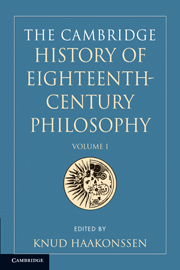Book contents
- Frontmatter
- CONTENTS
- Preface
- Methods of reference and abbreviations
- List of contributors
- I The Concept of Eighteenth-Century Philosophy
- II The Science of Human Nature
- 7 Philosophical Methods
- 8 Human Nature
- 9 Perception and Ideas, Judgement
- 10 Self-Consciousness and Personal Identity
- 11 Reason
- 12 Substances and Modes, Space and Time
- 13 Causality
- 14 Knowledge and Belief
- 15 Scepticism
- 16 Philosophy of Language
- 17 Rhetoric
- 18 Aesthetics
- 19 The Active Powers
- 20 Education
- Biobibliographical Appendix
- Bibliography
- References
19 - The Active Powers
from II - The Science of Human Nature
Published online by Cambridge University Press: 28 March 2008
- Frontmatter
- CONTENTS
- Preface
- Methods of reference and abbreviations
- List of contributors
- I The Concept of Eighteenth-Century Philosophy
- II The Science of Human Nature
- 7 Philosophical Methods
- 8 Human Nature
- 9 Perception and Ideas, Judgement
- 10 Self-Consciousness and Personal Identity
- 11 Reason
- 12 Substances and Modes, Space and Time
- 13 Causality
- 14 Knowledge and Belief
- 15 Scepticism
- 16 Philosophy of Language
- 17 Rhetoric
- 18 Aesthetics
- 19 The Active Powers
- 20 Education
- Biobibliographical Appendix
- Bibliography
- References
Summary
In 1751, in the Discours préliminaire for the great encyclopedia he and Denis Diderot were editing, Jean d’Alembert proclaimed a simple scheme for organising ‘the sciences of man’. The divisions of this science, he said,
are derived from the divisions of his faculties. The principal faculties of man are the understanding and the will; the understanding, which it is necessary to direct toward truth; the will, which must be made to conform to virtue. The one is the object of logic, the other is that of ethics.
D’Alembert’s dichotomy was not one of the novel ideas put forward in the Encyclopédie. It had forerunners in antiquity, and Descartes used a revised form of it. Locke seemed to use a similar classification, but he stated it in different terms, and for good reason. If we speak of understanding and will as faculties of mind, he said, we may be tempted to suppose that the words ‘stand for some real Beings in the Soul, that performed those Actions of Understanding and Volition’. But the idea that there are ‘distinct Agents’ in us breeds nothing but confusion. Locke chose to talk of the powers of the mind and, without making a fuss about it, sometimes classified them as active and passive (see, for instance, Essay Concerning Human Understanding, II.xxi.72).
Leibniz also objected to the ‘personification or mythology’ in which the will is imagined as ‘alone active and supreme … like a queen … whose minister of state is the understanding, while the passions are her courtiers’. Taken literally, the view would be incoherent, leading to an endless multiplication of faculties to explain how the will can take account of reasons produced by the understanding.
- Type
- Chapter
- Information
- The Cambridge History of Eighteenth-Century Philosophy , pp. 557 - 607Publisher: Cambridge University PressPrint publication year: 2006
References
- 6
- Cited by



